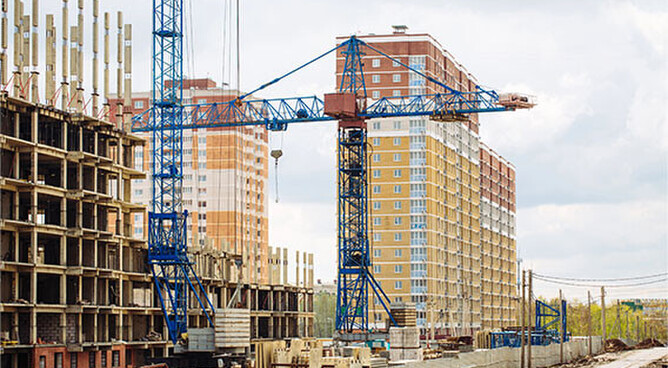Commercial building construction services play a key role in the development of residential, office, and retail spaces. These services include the planning, design, and construction of structures designed to meet specific business needs.
From managing building permits to overseeing construction teams, these services make sure that every aspect of a commercial project runs smoothly. A comprehensive approach focuses on delivering high-quality results, from the groundwork to the finishing touches.
What Are Commercial Building Construction Services?
Commercial building construction services encompass the entire process of constructing buildings intended for business or commercial use. These services include a variety of tasks, such as architectural design, engineering, site preparation, and project management.
The goal of commercial construction is to create spaces that are functional, safe, and tailored to the specific needs of the business or industry.
Professional contractors in this field handle everything from obtaining permits and materials to coordinating labor and managing the construction process. This makes sure that projects are completed on time and within budget.
Benefits of Hiring a Professional Contractor
Expertise
Professional contractors bring expert knowledge to your project. They handle everything from site assessments to final construction. They understand the complexities of the building process and know how to navigate challenges efficiently. Their expertise helps to avoid common pitfalls and guarantees the project meets your specifications.
Time Efficiency
Experienced contractors manage schedules effectively. This makes sure that construction projects are completed within the agreed timeframe.
Their experience allows them to foresee potential delays and resolve issues before they impact the overall timeline. Working with a professional, you can avoid unnecessary setbacks and keep your project on track.
Cost Control
A professional contractor helps to keep the project within budget by providing accurate cost estimates and tracking expenses. They have the skills to identify cost-effective solutions without compromising quality. With a professional contractor, you can avoid overspending and keep your project financially efficient.
Quality Assurance
Hiring a skilled contractor guarantees that the construction is completed to the highest quality standards. They work with trusted subcontractors and make sure that the materials used meet industry specifications. Their oversight helps maintain consistent quality throughout the project.
Commercial Construction Phases: An Overview
Pre-Construction
The pre-construction phase sets the stage for the entire project. It includes site analysis, obtaining permits, and finalizing the design. Detailed planning is important to prevent delays during construction. The contractor and project team prepare by establishing a timeline, budget, and resource allocation plan.
Construction
In this phase, the building process begins. Contractors mobilize their teams and materials– following the approved plans. The construction phase involves site excavation, foundation work, structural framing, electrical installation, and interior finishing. Regular inspections make sure that everything meets the required standards.
Post-Construction
After the building is completed, post-construction involves final touches. This phase includes inspections, punch lists, and the transfer of the completed building to the owner. Contractors address any issues that arise during this phase and make the building ready for occupancy and operational use.
Cost Considerations for Commercial Construction Projects
Commercial construction projects require careful cost management so that they stay within budget. Costs can vary depending on the size and complexity of the project.
Factors such as materials, labor, permits, and unexpected challenges can all influence the final price. Budgeting effectively and having a clear financial plan will help the project remain financially feasible.
Budgeting, Estimating, and Financial Planning Tips
Effective budgeting, estimating, and financial planning are essential to controlling the costs of commercial construction projects. Start by establishing a clear budget that includes all aspects of the project, from materials to labor costs.
Use detailed cost estimates to make sure the project stays on track and adjust the budget as necessary to account for unforeseen expenses. Keep track of expenditures throughout the project and work closely with the contractor to manage costs effectively.
Selecting Materials for Commercial Construction Projects
Choosing the right materials is a significant factor in the overall success of a commercial construction project. Materials need to align with the building’s function, budget, and aesthetic. Selecting durable and cost-effective materials guarantees longevity and minimizes future maintenance.
Cost-Effective and Sustainable Material Choices
Cost-effective and sustainable materials are increasingly popular in commercial construction due to their long-term benefits. These materials reduce the environmental impact and save money over time.
Builders often choose materials like recycled steel, energy-efficient glass, and sustainable wood products to create buildings that are both eco-friendly and affordable.
Navigating Building Codes and Zoning Laws
Building codes and zoning laws play a critical role in determining the design and construction of commercial buildings. These regulations govern the structure’s safety, accessibility, and environmental impact. Knowing how to navigate these laws helps a construction project remain compliant.
How Regulations Affect Commercial Construction Costs
Regulations significantly impact construction costs by requiring specific materials, designs, or systems that meet safety or environmental standards.
Compliance with these regulations may increase initial costs. However, they help avoid fines and delays later on. Builders must stay up-to-date on local building codes to accurately estimate project costs and prevent unforeseen expenses.
What to Look for in a Contractor
Experience
A contractor’s experience in commercial construction shows that they can handle any challenges that may arise. They understand the intricacies of the process and have a network of trusted subcontractors. Experience guarantees that the contractor can provide solutions for any unforeseen issues.
Licensing and Insurance
Make sure that the contractor is properly licensed and insured to work on commercial construction projects. Licensing guarantees the contractor meets industry standards. Meanwhile, insurance protects you from potential liabilities during construction.
Project Management Skills
A contractor’s project management skills are important for keeping your construction project on track. They must be able to oversee all aspects of the build, coordinate with subcontractors, and manage budgets.
Communication
Effective communication with the contractor makes sure the project stays on track and your concerns are addressed promptly. A contractor who listens to your needs and provides regular updates helps create a smooth construction process.
Get Started with PE Builders Today
Contact PE Builders for top-tier commercial construction services in New York. We specialize in both residential and commercial projects, with a range of services from new builds to remodeling.
As a full-service construction company, we help bring your vision to life with precision, quality, and sustainability. Trust our team to deliver results that exceed expectations, on time and within budget. Reach out today to start your next project with PE Builders.

